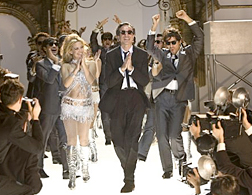Low Note
The musical Nine is bad in a compelling way.
After you've seen Nine, come back here and check out our Spoiler Special discussion:
You can also download the program here, or you can subscribe to the Spoiler Special podcast feed via iTunes or directly with our RSS feed.
Late December is musical season, time for the release of movies like Chicago, Dreamgirls, or Rob Marshall's latest, Nine (The Weinstein Company): expensive, ungainly screen adaptations of Broadway musicals packed with movie stars whose disproportionate off-screen fame makes them stick out like plums in a Christmas pudding. These musicals seem intended to remind us of the kind of movies "they" don't make anymore, but really, the only thing they remind us of is one another. (Last year's Mamma Mia! doesn't count in this category; it was released in summer, not at Christmastime, and was a fluffy jukebox musical with no aspirations to Oscar prestige.) This kind of movie is superfluous yet strangely compelling. We don't need to see Daniel Day-Lewis and Nicole Kidman sing a duet next to a Roman fountain any more than we need to see an elephant pirouette in a tutu, but wouldn't you be crazy to pass up the opportunity to see either?
That elephant-in-a-tutu analogy works in more ways than one. There's something about Nine that smacks of the freak show, or the zoo: Step right up, pay $10, and you can see eight superstars, six of whom have won Oscars, singing songs in sparkly costumes. Two of them, Penelope Cruz and Marion Cotillard, will at some point get nearly naked. Never mind that the songs range from mediocre to actively unlistenable and that few of these actors know how to put over a song. Nine is abundantly stocked with star power, but the energy these charismatic performers generate is never harnessed in the service of the movie.
As Guido Contini, the tormented Italian filmmaker whose fantasy life provides a pretext for the musical numbers, Daniel Day-Lewis has none of the suave dissolution of Marcello Mastroianni, the hero of Fellini's 8 ½, which inspired the original stage show. His Guido is neurasthenic and disheveled, perpetually on the verge of either a laughing or weeping fit. At a creative impasse in his career, Guido is under pressure to begin production on his next film, but despite his blustering press conferences about how the results will change cinematic history, he doesn't even have a script yet. So Guido retreats to a seaside resort town to pretend to write, to fantasize about the women he's known, and to carry on with his needy, fragile mistress (Penelope Cruz), who, like him, is already married. That, essentially, constitutes the entire action of Nine. Once he's reached the resort town, Guido does little but run his fingers through his hair and smoke while waiting for another musical number to begin inside his brain. Leave it to Day-Lewis, the most cerebral of leading men, to sell us on the idea that a character this uninteresting has a rich inner life.
Luckily for the stir-crazy audience, Guido has company for his sojourn by the sea. Lilli (Judi Dench), an old friend and the costume designer for his films, arrives to harass him (affectionately) about his nonexistent script. And his wife, Luisa (Marion Cotillard), shows up unexpectedly, providing the occasion for some adultery-based melodrama and the film's best musical number, "Take It All," in which the astonishingly talented Cotillard performs a physical and emotional striptease. But when Guido's muse, an Anita Ekberg-like Scandinavian actress named Claudia (Nicole Kidman) flies in for a costume fitting, everything grinds to a halt again. Kidman and Day-Lewis' duet by that fountain may be the movie's musical and dramatic low point. We've been given no idea what these characters' past relationship is or what they mean to each other, so her revelation that he's "special to me in my life/ since the first day that I met you" rings no truer than a junior-high yearbook inscription. (Then there's the fact that Kidman has entered some strange phase in her career in which she appears to have been replaced by her own Madame Tussaud's figure. But that's a whole other column.)
As in Chicago, Marshall's big plan for dynamically transferring the spectacle from stage to screen is to stand in front of a proscenium stage and swoop his camera around. Full-length shots of singing and dancing bodies are rare, and quickly interrupted by edits, as if Marshall is afraid to let us see his cast in action. One of the more effective numbers, "Be Italian," works largely because it tries less hard than the others to be cinematic, and because the Black Eyed Peas' Fergie, playing the village prostitute Saraghina, abounds in the broad, sassy vulgarity the song requires.
Ultimately, Nine's problem is simple. Translations of stage musicals to the screen rarely work unless the songs are really, really good, and even then, it's tricky. And these songs, with music and lyrics by Maury Yeston, are a far cry from Rodgers and Hart—when I say "Be Italian" is the catchiest song in the score, I'm grading on a serious curve. I wasn't a fan of Marshall's Chicago, with its frantic camerawork and calculated Oscar-seeking behavior, but I can still hum at least three songs from the score. Nine seems unlikely to garner any little gold men, but in a way it already has them. Watching it is like watching six Oscar statuettes interact onscreen.
Become a fan of Slate on Facebook. Follow us on Twitter.
Slate V: The critics on Nine and other new releases

